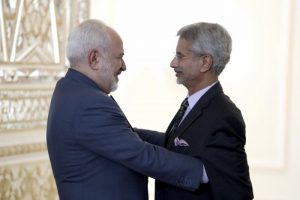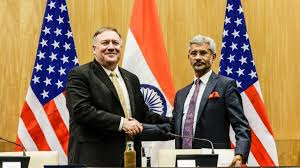
India’s high stakes in the aggravating US-Iran standoff following the assassination of a top Iranian military commander by a US drone strike have been underlined by proactive diplomacy on New Delhi’s part.
A day after the killing of Major General Qasem Soleimani in Baghdad at the behest of US President Donald Trump, India promptly called for restraint and de-escalation. A statement by India’s Ministry of External affairs underscored the need for maintaining peace, stability and security in this region. This was followed by External Affairs Minister S. Jaishankar engaging key players in the regions.
In telephone calls to US Secretary of State Mike Pompeo, Iranian Foreign Minister Javad Zarif and Oman’s Foreign Minister Yusuf Alawi on January 5, Mr Jaishankar underscored India’s high stakes and concerns at the situation taking a serious turn, with Tehran and Washington locked in a fierce war of words.
“Just concluded a conversation with FM @JZarif of Iran. Noted that developments have taken a very serious turn. India remains deeply concerned about the levels of tension. We agreed to remain in touch,” Mr S. Jaishankar said in a Twitter post.
Mr Zarif is expected to be in New Delhi January 14-16 for the annual Track 1.5 security and foreign policy conclave entitled “Raisina Dialogue.”

In the conversation with Mr Pompeo, Mr Jaishankar highlighted India’s stakes and concerns. “Had a telephonic discussion with Secretary of State @SecPompeo on the evolving situation in the Gulf region. Highlighted India’s stakes and concerns,” Mr Jaishankar said in a Twitter post.
Mr Pompeo’s version of the telephonic conversation focused on Iran’s threats and provocations.
“@DrSJaishankar and I spoke just now regarding Iran’s continued threats and provocations. The Trump Administration won’t hesitate to act to keep American lives, and those of our friends and allies, safe,” Pompeo said in his post.
“Secretary of State Michael R. Pompeo spoke today to Indian Minister of External Affairs Subrahmanyam Jaishankar to discuss Iran’s continued provocations and threats to the region,” US State Department Spokesperson Morgan Ortagus said separately.
India’s vital interests
Going forward, India’s political-diplomatic establishment will be keeping a close watch on the evolving crisis in the region, with two of its strategic partners locked in a vicious cycle of threats and counter-threats. Mr Trump ordered the killing of Major General Suelimani as he regarded him a terrorist mastermind responsible for killing hundreds of Americans. Tehran has vowed retaliation and branded Mr Trump as a “terrorist in suit.”
Any escalation will be bad news for India’s vital strategic and economic interests in the region, which is home to around 8-million strong Indian diaspora. The West Asia region remains a lynchpin of India’s energy security and accounts for over 80 per cent of the country’s imported oil. Any sharp spike in oil prices in the wake of rising tensions and uncertainty will hurt the Indian economy, which is already decelerating. Against this backdrop, India should continue to engage all key players proactively to prevent a full-blown military conflict between the US and Iran.
Author Profile

- Manish Chand is Founder and Editor-in-Chief of India Writes Network (www.indiawrites.org) and India and World, a pioneering magazine focused on international affairs. He is CEO, Centre for Global India Insights, an India-based think tank focused on global affairs.
Latest entries
 India and the WorldFebruary 27, 2026Modi visit: India-Israel partnership enters a new era
India and the WorldFebruary 27, 2026Modi visit: India-Israel partnership enters a new era India and the WorldFebruary 24, 2026Unravelling Modi’s Israel journey: What to expect
India and the WorldFebruary 24, 2026Unravelling Modi’s Israel journey: What to expect India and the WorldFebruary 17, 2026South-by-South: Focus on people-centric solutions at India AI summit
India and the WorldFebruary 17, 2026South-by-South: Focus on people-centric solutions at India AI summit India and the WorldFebruary 7, 2026Modi hails interim India-US trade deal, Goyal says no concessions made on agriculture
India and the WorldFebruary 7, 2026Modi hails interim India-US trade deal, Goyal says no concessions made on agriculture







